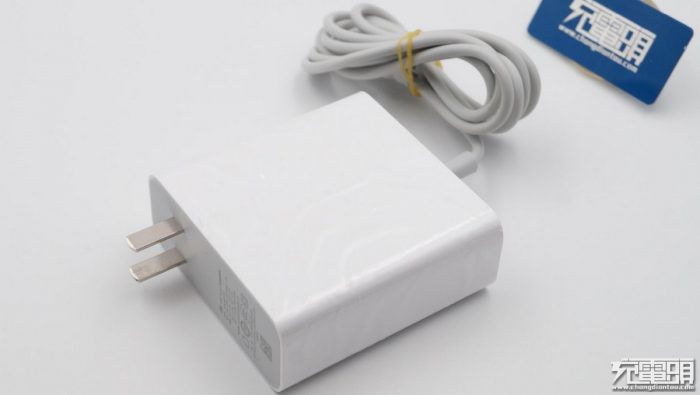Today, we will start the teardown of the Xiaomi USB Type-C 65W power adapter.

The Xiaomi USB Type-C 65W power adapter looks basically the same as the 45W power adapter except for its slightly larger volume.
The root of the power output cable is reinforced to ensure durability. In addition, we can also see the Xiaomi logo.
The power adapter supports 5V, 9V, 12V, 15V, and 20V voltage output types. Its max output power is 65W.
The volume difference between 45W and 65W power adapter
The cover of the electric supply plug is ultrasonic-welded. After removing the cover with a crowbar, we can see the glue between the power circuit and the shell. However, the power circuit still can’t be removed after we remove the glue. Therefore, we need to open the tail cap on the output side.
The tail cap adapts a dual-layer design. The top layer is welded with the bottom layer through the ultrasonic process.
There is a circular hole near the output cable. Use a proper screwdriver to push it slightly.
Take out the metal shield cover.
It is the back of the circuit. Such a component layout is good for power heat dissipation.
Protection on an output end of the electronic supply and EMI circuit.
The main capacitor is covered by an independent metal shield cover.
From the slot, we can see the main capacitor’s brand and specification. Taiwan Chinsan ELITE 420V 120μF.
The rectifier bridge shares a heat dissipation chip with the main switching regulator.
Blue anti-interference capacitor
Two electrolytic capacitors on the output side are in parallel. SAMXON 25V 470μF. Taiwan Chinsan ELITE 25V 680μF.
The Type-C output cable has three cables.
LITEON rectifier bridge KBP208GL 2A800V.
Toshiba K3569 main switching regulator
Taiwan Weltrend USB PD controller WT6630P
LITEON Schottky barrier rectifier G40120CTW
Use POWER-Z to trigger the fast charging mode, and the result suggests that the adapter fails to support any popular fast charging mode.
Use POWER-Z to trigger PD mode, and the result suggests that all the max currents that the adapter supports in different voltages under PD mode are completely consistent with the data on the product package.